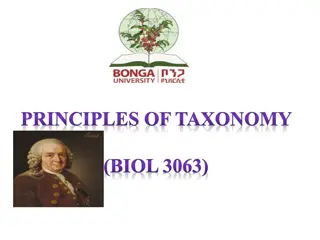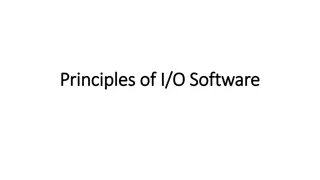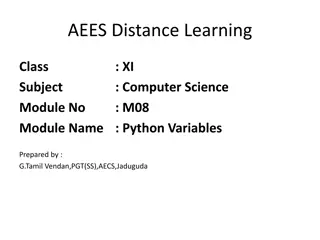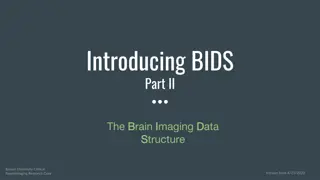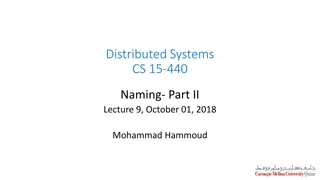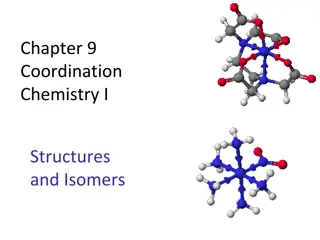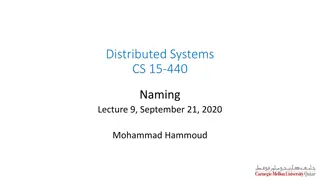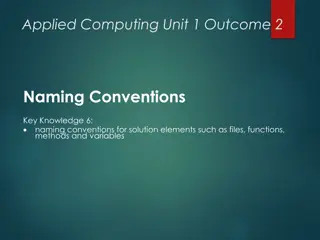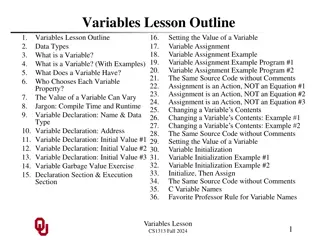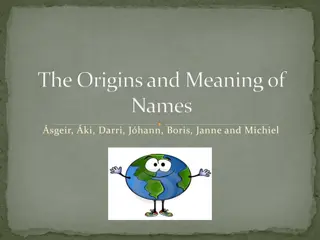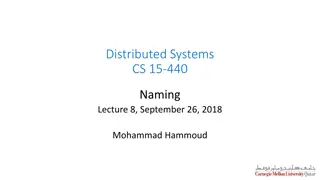Understanding the Concept of Return to Factor in Production Economics
Return to Factor is a key concept in production economics that explains the relationship between variable inputs like labor and total production output. The concept is based on the three stages of production - increasing returns, diminishing returns, and negative returns. By analyzing the behavior o
0 views • 7 slides
Efficient File Naming Conventions and Folder Organization
Learn best practices for naming files and structuring folders to improve organization and efficiency. Explore tips on file naming, consistency, leading zeros, format limitations, and folder hierarchy. Enhance your workflow by implementing a logical system that streamlines file management.
0 views • 13 slides
Fundamentals of Taxonomy Explained: From Classification to Nomenclature
Taxonomy, derived from Greek roots, encompasses the science of classifying organisms and understanding their variations, evolutionary relationships, and naming conventions. It involves description, identification, classification, and nomenclature of both living and extinct organisms. The practices o
1 views • 39 slides
Mastering Compound Naming for Chemistry Students
Develop your ability to name compounds and write their chemical formulas with ease by understanding the naming conventions for different compound types. Learn about compounds composed of metal and non-metal elements, compounds containing oxygen, and those made only of non-metals. Practice naming spe
2 views • 14 slides
Understanding Accounting Conventions and Principles
Accounting conventions are common practices adopted by accountants through general consensus, different from accounting concepts established by law. Key conventions include full disclosure, consistency, conservatism, and materiality, each guiding the disclosure and treatment of financial information
0 views • 6 slides
Family Relations and Relatives Naming Guide
Explore a comprehensive guide to naming relatives based on family relationships, from uncles' sons to sister's daughter's brother's father. Learn how to identify and address various family members accurately using distinctive titles.
0 views • 24 slides
Principles and Goals of I/O Software Explained
This informative content discusses the principles and goals of I/O software, including device independence, uniform naming, error handling, synchronous vs asynchronous operations, and buffering. It emphasizes the importance of writing programs that can access any I/O device without specifying the de
5 views • 20 slides
Understanding TVT Digital Technology Co., Ltd. Product Naming Rules
This document by Shenzhen TVT Digital Technology Co., Ltd. provides detailed insights into their product naming rules. It covers the overall classification, codec specifications, DVR configurations, and more, aiding customers in better understanding TVT products through clear naming conventions.
0 views • 41 slides
Understanding Caretaker Conventions in Government Ahead of Elections
Caretaker conventions are a set of practices followed by governments before elections to ensure fair governance transitions. These conventions aim to preserve the autonomy of incoming governments, prevent unfair advantages, and maintain political neutrality in the public sector. During the caretaker
0 views • 8 slides
Python Variables: Understanding Declaration, Naming Rules, and Assignment Operators
Python variables are essential for storing values in reserved memory locations. This article covers the basics of variables in Python, including declaration, assigning values, naming rules, multiple assignments, deleting variables, and assignment operators. Learn how to create, name, and manipulate
0 views • 11 slides
Understanding BIDS File Naming Conventions
BIDS (Brain Imaging Data Structure) establishes standardized naming conventions for organizing neuroimaging data. It outlines rules for labeling subjects, sessions, tasks, runs, modalities, and exceptions. The structure helps maintain consistency and facilitates data sharing and collaboration in the
7 views • 11 slides
Understanding Marginal Costing in Cost Accounting
Marginal Costing is a cost analysis technique that helps management control costs and make informed decisions. It involves dividing total costs into fixed and variable components, with fixed costs remaining constant and variable costs changing per unit of output. In Marginal Costing, only variable c
1 views • 7 slides
Understanding Naming in Distributed Systems
Exploring the concepts of naming in distributed systems, including flat naming, structured naming, name spaces, name resolution, and name linking. Examples and visual explanations are provided to illustrate each concept, emphasizing the importance of structured and organized naming schemes in distri
0 views • 28 slides
Understanding Naming Rules in Veterinary Parasitology
Explore the essential rules and regulations defined by the International Code for Zoological Nomenclature (ICZN) in the field of General Veterinary Parasitology. Learn about the nomenclature of parasites, scientific naming conventions for genera and species, and the classification of parasites in th
1 views • 14 slides
Ratio Method of Estimation in Statistics
The Ratio Method of Estimation in statistics involves using supplementary information related to the variable under study to improve the efficiency of estimators. This method uses a benchmark variable or auxiliary variable to create ratio estimators, which can provide more precise estimates of popul
0 views • 30 slides
Chemistry: Naming Compounds and Writing Formulas
Understand compounds, chemical formulas, and how to write ionic formulas using the Swap 'n Drop Method. Learn about types of compounds - ionic, covalent, and acids, and practice writing formulas for various elements. Follow rules, naming flow charts, and partner activities to enhance your understand
0 views • 13 slides
Understanding Coordination Chemistry: Structures, Isomers, and Naming
Exploring coordination chemistry involves understanding structures, isomers, naming conventions, and common coordination numbers, all essential in studying coordination compounds. Coordination compounds consist of central metals, ligands, and charge balancing ions. Naming involves listing cations, l
0 views • 46 slides
NODC NetCDF Templates for Oceanographic Data Management
Explore the integration of CF and ACDD conventions into the NODC NetCDF templates for organizing oceanographic data. Learn about the benefits, attribute conventions, CF feature types, and how to apply the conventions to your datasets effectively. Use the provided decision tree and examples to stream
0 views • 19 slides
The Importance of Naming in Software Development
Effective naming of variables, functions, and concepts is crucial in software development to enhance readability, maintainability, and communication among team members and stakeholders. This article stresses the significance of thoughtful naming conventions, providing insights into the impact of nam
0 views • 50 slides
Load Following by Nuclear Power Plants in Relation to Variable Renewable Energies' Development
The study explores the requirements of load following by nuclear power plants in the context of variable renewable energies' growth. It discusses the impact of renewable energy development on nuclear economic models and the need for dispatchable capacities. Benchmarks are set to test robustness of d
0 views • 11 slides
Understanding Organic Chemistry: Functional Groups and Naming Rules
Delve into the world of organic chemistry with a focus on functional groups like alcohols, ethers, aldehydes, and ketones. Explore the rules for naming these compounds, understanding their structures, and how they impact the properties of molecules. From alcohols with hydroxy groups to ketones conta
0 views • 21 slides
International Agreements on Means and Methods of Warfare Throughout History
Explore the evolution of international agreements regulating means and methods of warfare from the 19th century to the present day, focusing on limitations imposed on belligerents to protect civilians and combatants. Various treaties and conventions such as the Hague Conventions, Geneva Conventions,
0 views • 23 slides
Understanding Lexical Semantics: An Overview
Lexical semantics explores the relationships words have with each other and with our understanding of reality. It delves into reference and sense, naming theory, synonymy, and more. Reference focuses on how words relate to objects, while sense deals with relationships between lexical items. Naming t
0 views • 10 slides
Python Basics: Comments, Variable Names, Assignments, and More
Learn about the basics of Python programming, including the use of comments to explain code, defining variable names, type conversion, assignment operators, and general guidelines for coding practices. Explore how to effectively use comments to describe code functionality and understand the signific
0 views • 21 slides
Naming Conventions in IEEE 802.15 TG3d Proposal
This document discusses naming conventions in the context of IEEE 802.15 TG3d, focusing on the THz PHY, pairnet concept, and HRCP applications. It distinguishes between TG3d and TG3e, highlighting commonalities and differences in device operations, frequency bands, and application scenarios.
0 views • 9 slides
Understanding Compounds and Elements through Experiments
Explore the world of compounds and elements through engaging experiments involving magnesium, oxygen, and more. Learn about the energy released when elements combine, naming conventions for various compounds, and the significance of oxygen in compound naming. Discover essential elements and their sy
0 views • 10 slides
Essential Information on Naming Compounds, Cations, and Anions
Learn about the essential elements, symbols, and polyatomic ions you need to know for naming compounds correctly. Understand rules for naming compounds when elements combine, including diatomic molecules, halogens, oxygen, and sulfur. Explore polyatomic ions with different charges and their names to
0 views • 12 slides
Understanding Distributed Hash Table (DHT) in Distributed Systems
In this lecture, Mohammad Hammoud discusses the concept of Distributed Hash Tables (DHT) in distributed systems, focusing on key aspects such as classes of naming, Chord DHT, node entities, key resolution algorithms, and the key resolution process in Chord. The session covers various components of D
0 views • 35 slides
Best Practices for Naming Conventions in Solution Development
Understand the importance of naming conventions for files, functions, methods, and variables. Learn how proper naming can enhance code readability, avoid potential errors, and ensure consistency across projects. Discover tips to create effective names that are easily understood, self-descriptive, an
0 views • 20 slides
Understanding Variables in Programming
Variables in programming are essential components that store data with specific properties such as name, address, data type, and value. This summary covers the basics of variables, their characteristics, declaration, initialization, assignment, and common conventions related to variable naming. It a
0 views • 36 slides
Understanding Sample Ballots: Production, Distribution, and Naming Process
Explore the significance of sample ballots in elections, detailing how they are produced, distributed, and named. Discover their usage, importance for different elections, creators, and the methods of delivery to election administration systems. Learn about file naming conventions, ballot vendor inv
0 views • 14 slides
Enhancing Operational Efficiency and Collaboration in Project Management
This content provides insights into the changes happening in the online quotes release webinar organized by Brian Donlon and Olivier Perrigueur. It discusses aligning CRM and quoting tools, standardizing project naming conventions, and identifying primary influencers. Additionally, it explores the b
0 views • 12 slides
Exploration of Fossils and Compounds in Science Learning
Archaeologists search for fossils in specific types of rocks, while students learn about compounds and their formation through engaging activities. Compounds are combinations of two or more elements, each with distinct naming conventions. Students practice naming compounds based on their constituent
0 views • 10 slides
Exploring the Origins and Meanings of Names from Different Cultures
Delve into the fascinating world of name origins and meanings across various cultures, including Flemish, Hebrew/Christian, European, Icelandic, Nordic, and international names. Discover the significance behind names like Janne, Michiel, Agnar, Daniel, and more, illustrating the rich tapestry of nam
0 views • 12 slides
Understanding Covalent Bonds and Nomenclature
Explore the concepts of covalent bonding, where electrons are shared between atoms, leading to the formation of stable molecules. Learn the nomenclature rules for naming covalent compounds using prefixes and root names. Discover the nature of diatomic molecules and the naming conventions for acids.
0 views • 42 slides
Understanding Naming Systems in Distributed Systems
Entities in distributed systems are uniquely identified using names, addresses, and identifiers. Naming systems assist in name resolution and can be categorized into flat, structured, and attribute-based naming. Flat naming uses random strings as identifiers, and various mechanisms such as broadcast
0 views • 21 slides
Master Set of High School Chemistry Naming Rules
A collection of chemical compounds with their names and classifications as ionic or molecular. Includes explanations and ratios for naming compounds such as Co(OH)3, Mn(NO2)3, SiO2, Mn(MnO4)4, SF2, and ZrO2. Helpful for high school chemistry students to practice and understand naming rules.
0 views • 49 slides
Understanding Ionic Bonding and Naming in Chemistry
Exploring the fundamentals of ionic bonding, naming conventions, and the Octet Rule in chemistry. Learn about Lewis structures, formation of ionic compounds, and the role of valence electrons in determining chemical properties. Discover how elements gain or lose electrons to achieve a full outer ene
0 views • 24 slides
Standard Naming Convention for Table of Contents
This document outlines the standard naming convention for organizing and labeling Table of Contents related to payer and issuer information, plan details, file types, and extensions. It includes specific examples and guidelines for naming files accurately and consistently. Adherence to these standar
0 views • 38 slides
Pointer and Reference Conventions in C++ Programming
Understanding the conventions for passing pointers and references in C++ is crucial for safe and effective programming. Different forms allow various levels of control, from read-only access to modification rights, each signaling a specific intent. These conventions help prevent unexpected behavior
0 views • 21 slides


